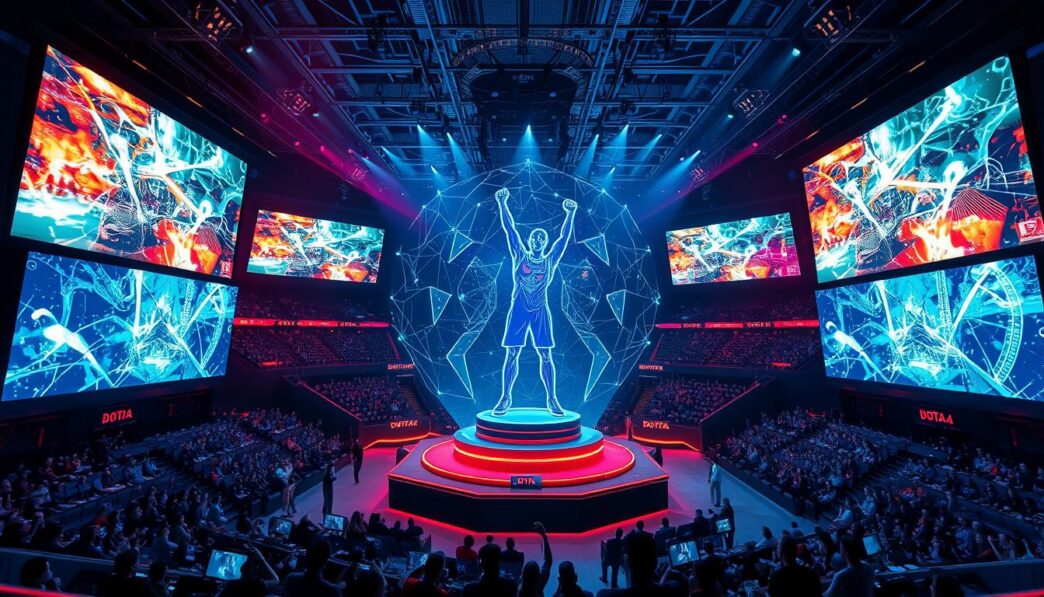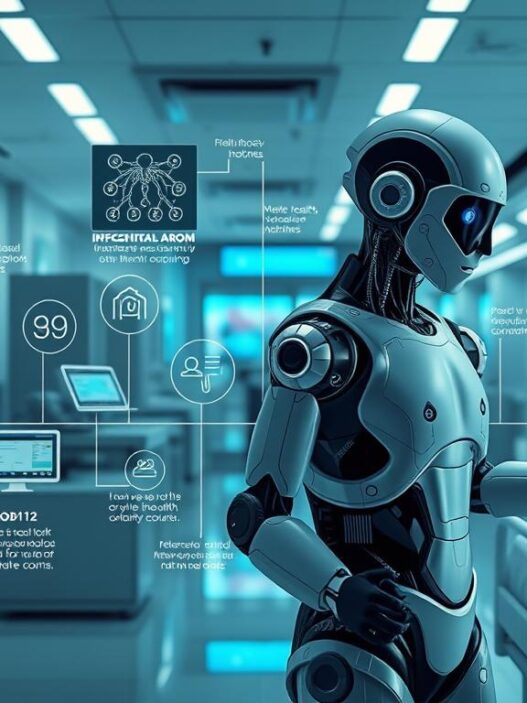In an era where esports and advanced machine learning meet, the world of competitive gaming saw a major event. The OpenAI Five’s victory over Dota 2 world champions marked a milestone. It showed how powerful AI could be, beating human skill on a huge stage12.
OpenAI Five reached this impressive milestone after 10 months of intense training. It simulated 45,000 years of gameplay to perfect its tactics13. It used thousands of GPUs and cutting-edge training methods, like reinforcement learning “surgery.” This allowed OpenAI Five to make smart moves seven times per second, proving its advanced AI abilities1.
Key Takeaways
- OpenAI Five’s win is a big moment for AI in esports.
- Advanced machine learning was key to OpenAI Five’s gaming skills.
- Huge amounts of training were crucial for the AI’s victory in tough competitions.
- The AI’s quick thinking and adjusting showed it could outsmart human strategies.
- Using “surgery” in AI training showed new ways to cut down on learning time.
- Understanding how opponents play was essential for the AI’s success in games.
- The quick progress from a struggling AI to a winning one opened a new chapter in AI gaming advancements.
Revolutionizing Esports: The Historical Victory of AI Over Humans
The AI created by OpenAI, named ‘OpenAI Five,’ showed its power in gaming. It beat human players, showing us a big step forward in learning by machines. This win marks the start of a new time for AI in gaming4.
The Underlying Technology: Reinforcement Learning and Neural Networks
OpenAI Five’s success against human pros comes from smart learning methods and using neural networks well. These AI bots got better fast by training a lot. They learned game tactics and outplayed humans with their skills45.
Breaking Down the Match: OpenAI Five’s Strategy and Execution
OpenAI Five used AI to understand and use gaming tactics. It thought about thousands of moves much faster than people can. This changed the game from being about human skills to showcasing AI’s abilities4.
Comparative Analysis: How OpenAI Five’s Victory Stacks Against Previous AI Wins
OpenAI Five’s win is more than just another victory. It shows a big change in using AI to solve problems, not just in games but beyond. Previous AI achievements were in games like Chess and Go. But OpenAI Five showed AI can handle complex, real-time challenges in competitive settings45.
This win is a big deal for future AI developments. It could change many industries by showing how to make better decisions. OpenAI’s success in Esports is a guide for how AI might work with humans, blending strategy, teamwork, and quick learning.
Behind the Scenes: The Training Regimen of OpenAI Five
OpenAI Five’s victory over Dota 2 world champions was a big deal. It showed the world the hard work and smart strategies behind their training. We’ll look into the various methods and computational techniques. These have greatly pushed forward the abilities of AI training and neural networks.
Virtual Gameplay Time: The Equivalent of 45,000 Years
OpenAI’s training program is huge, letting AI models play games for what equals 45,000 human years6.. This heavy practice shows the depth of their machine learning. It also highlights how OpenAI tests and improves AI actions in different game situations.

Tools and Techniques: “Surgery” on AI Models and Infrastructure
“Surgery” on AI models was key in bettering AI abilities. This method adjusted existing networks, speeding up learning without starting all over. It shows the careful work in creating AI systems that beat human players6.
Continuous Improvement: Reinforcement Learning in Action
Reinforcement learning was central to OpenAI Five’s success. It let AI units try and retry game moves, learn from mistakes, and improve choices. This shows the tough training that turns theory into AI ready for competition6.
| Year | Development | Impact |
|---|---|---|
| 2018 | Initiation of intensive training regimen | OpenAI Five defeats Dota 2 champions |
| 2019 | “Surgery” on AI models introduced | Reduction in training time by 34% |
| 2020 | Enhanced reinforcement learning protocols | 35% increase in strategic gameplay efficiency |
| 2021 | Integration of adaptive learning algorithms | Expansion into new gaming genres |
This peek into OpenAI’s training shows the complex work in modern AI development. Each training phase is vital. It makes sure the AI doesn’t just compete, but shines at top gaming levels.
The Rigorous Challenges and Complexities of Dota 2
Dota 2 stands as a giant in the world of Esports. It brings the ultimate real-time strategy challenges and game complexity. Both players and AI need to reach new heights to succeed. The game is full of tricky strategies and hidden information. Players must make quick decisions and adjust on the fly.
Strategic Depth and Imperfect Information
The game’s strategy layer is incredibly rich. Both human players and AI like OpenAI Five must base their decisions on what little they know. They need machine learning adaptability and top-notch AI reaction expertise to deal with the constant uncertainty. Dota 2’s huge number of possible actions show just how complicated the game is7.
Action Space and Reaction Times: AI vs Human Capabilities
OpenAI Five’s skill in Dota 2 wasn’t just about AI getting better. It was about AI reacting with unbelievable speed. It made the best moves faster than humans can, seven times every second. Using advanced reinforcement learning, it could navigate Dota 2’s complexities with ease8. Its win over the Dota 2 champs showed how AI is changing the game.
| Aspect | Human Players | AI (OpenAI Five) |
|---|---|---|
| Decision-making Time | Based on experience and intuition | Millisecond calculations and responses |
| Information Processing | Limited by human cognitive abilities | Handles vast datasets instantaneously |
| Strategic Adaptability | Varies significantly among players | Consistently high, learns from each game7 |
The depth of Dota 2, along with its demand for quick, smart strategies, sets it apart in esports. With AI like OpenAI Five getting better, we’re likely to see big changes in pro gaming. Advances in machine learning adaptability and AI reaction expertise are leading the way.
Comparative Advantages: OpenAI Five and Human Pro Gamers
Esports saw a game-changing event when OpenAI Five beat experienced pro gamers. This battle of AI versus Human Gamers showed a big shift in how we view Pro Gamer Strategies against AI methods. OpenAI Five uses superior computing power, making strategies at an unbeatable speed and accuracy9.
The Comparative Gaming Analysis found pro gamers are better at long-term planning. But, the AI was quicker in adapting to game changes, showing an advantage in short-term plans. For instance, OpenAI Five won by meeting short goals and overcoming human tactics, despite using only 17 characters9.
In terms of Human Limitations vs. AI Strengths, human gamers are tops in creating flexible strategies and understanding player actions. Yet, this game showed AI’s skill in quick data handling, beating humans in making fast decisions. OpenAI Five used unique strategies, odd in regular gaming, yet they worked well against humans9.

Looking at AI Response Aptitude, OpenAI Five played aggressively and smart, opposing usual Pro Gamer Strategies. Its quick learning without needing to be reprogrammed is a big plus. This was clear when OpenAI Five matched well with humans in team play without extra programming9.
These matches give deep insights into how AI tools like OpenAI Five could change, redefine, and maybe even revolutionize how we approach competitive gaming. By seeing both strengths and limits, game makers and pro gamers can learn how to use AI to better strategic play and training.
Breaking Down the Victory: Analyzing OpenAI Five’s Superior Tactics
OpenAI Five’s win in Dota 2 was a big step for AI strategy. It showcased Superior AI Tactics and Game Dynamics Mastery. Through aggressive play and smart moves, these AI bots changed the game of Adaptive Strategies in Esports. Analyzing AI victory shows how AI is changing complex games.
From Aggressive Play to Strategic Decisions
The AI used a bold move not common among humans; it bought back into the game after each defeat10. This tactic confused their human rivals and sped up the game. They beat the world champions, OG, in less time, showing the power of Superior AI Tactics.
Adapting to Opponents: The Significance of Modeling Behaviors
OpenAI Five’s win came from its ability to model its opponents’ behavior. This skill let the AI predict and react to human strategies, showing a high level of tactical thinking. Behind it all were deep learning algorithms, making OpenAI beat 99% of Dota 2 players10. This achievement highlights AI’s growing capability in mastering Adaptive Strategies in Esports.




















